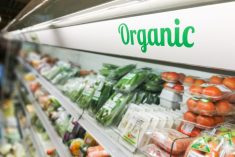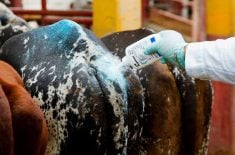SHANGHAI (Reuters) — China’s move to scrap its annual stockpiling program for soybeans shows its grain security policy is being redefined and could pave the way for liberalization of the corn trade, the founder of the country’s largest animal feed producer said.
China, which has long been obsessed with food security, finally scrapped its stockpiling system for soybeans and cotton this year, after it failed to boost planting by farmers while also pushing domestic prices well above international markets.
“The scrapping of the soy stockpiling program shows China is moving towards the direction of separating food and feed grains,” Liu Yonghao, Chairman of the New Hope Group, told Reuters in an interview on Thursday.
Read Also

American agriculture groups call for full renewal of Canada-United States-Mexico trade deal
American food and agriculture groups are calling for a full 16-year renewal of the Canada-United States-Mexico-Agreement (CUSMA).
New Hope is the largest consumer of corn in China and processed more than 18 million tonnes of corn into feed last year. The firm is also one of China’s largest suppliers of meat, eggs and dairy products.
“This will give farmers more choices on what they should produce and will pave the way for the opening up of overseas trade for feed grains, such as corn,” he said.
China, which became a net corn importer in 2010, currently maintains a quota system over most grains imports in an attempt to grow almost all of its consumption domestically.
But Chinese experts are increasingly arguing that growing grains, which require vast swathes of arable land and water, is less efficient than importing them. They also say it would be better to invest more in labour-intensive processing industries than farming.
“Opening up the feed market will help to transform China’s farming sector as well as boost food supplies,” said Liu, a member of China’s largest political advisory body and an influential voice on rural and agricultural issues.
Born in 1951 to a poor family in China’s Sichuan province, Liu’s entry into the farming sector began in the 1980s when he started a chicken farm with his three brothers.
Within six years, their turnover reached millions and they branched into the animal feed business. Liu then set up the New Hope Group in 1996, which is now one of the largest non-government conglomerates in the country.
Liu, now 63, said the group is stepping up overseas investments to meet the country’s growing demand for dairy and meat products.
“We will build factories in developing nations because those markets still have a lot of potential, and they have demand,” Liu said, adding that it was also scouring for opportunities in resource rich countries like New Zealand and Australia.
On developed nations, Liu said he was interested in investing in veterinarian pharmaceuticals, seed or meat processing companies.














